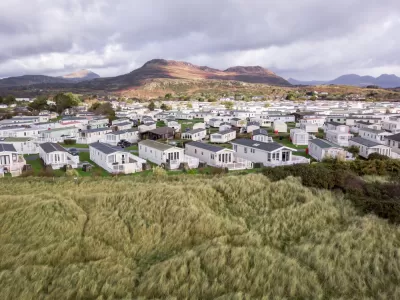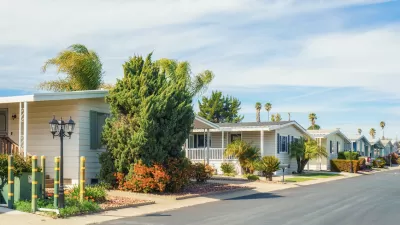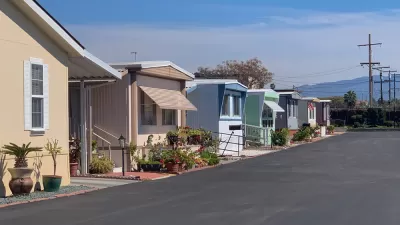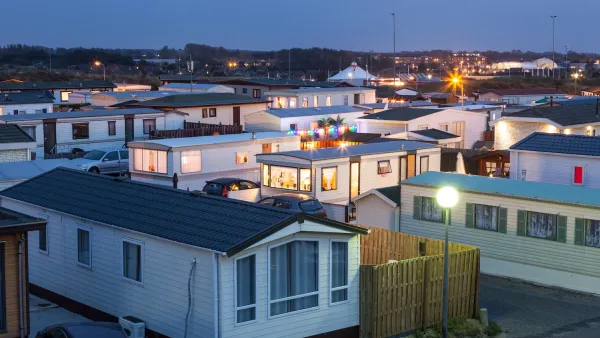Making it easier for mobile home park residents to collectively purchase the land they live on can protect their housing affordability for the long term.

“Because they don’t own the land beneath their homes, mobile home residents are at the mercy of the park’s owners, who could raise their rents or even shut down the park altogether as the land is redeveloped,” writes Kevin Hardy in Stateline. As more investors buy up mobile home parks, the resident ownership model is a key tool in the fight to keep this housing type affordable.
Coming together to buy one of these parks can be a daunting task for residents — but that could be changing. “Earlier this year, the federal government made available $225 million in grants for improvements at mobile home communities, including those owned by residents, and announced plans to allow resident-owned parks to access federally insured financing to keep rents low or make improvements.” These steps could pave the way for more cooperatively owned parks and protect residents from steep land rent hikes.
According to Hardy, “Currently, 22 states have laws requiring or encouraging owners of manufactured home parks to give homeowners the opportunity to purchase their land collectively. Those laws can vary wildly, with some requiring that the residents be given the right of first refusal, while others simply require park owners to provide notice of their intent to sell.” Some industry groups are pushing back, arguing that resident ownership is not always in the best interest of the residents.
Manufactured housing can cost as much as 45 percent less to build per square foot than site-built homes, making them an affordable option for lower-income households, but are often regulated out of neighborhoods largely due to unwarranted stigma. Now more states, including Maine and New Jersey, are enacting or strengthening laws aimed at encouraging collective ownership of mobile home parks and allowing manufactured housing in all residential neighborhoods.
FULL STORY: To save affordable housing, states promote resident-owned mobile home parks

Planetizen Federal Action Tracker
A weekly monitor of how Trump’s orders and actions are impacting planners and planning in America.

Congressman Proposes Bill to Rename DC Metro “Trump Train”
The Make Autorail Great Again Act would withhold federal funding to the system until the Washington Metropolitan Area Transit Authority (WMATA), rebrands as the Washington Metropolitan Authority for Greater Access (WMAGA).

DARTSpace Platform Streamlines Dallas TOD Application Process
The Dallas transit agency hopes a shorter permitting timeline will boost transit-oriented development around rail stations.

Renters Now Outnumber Homeowners in Over 200 US Suburbs
High housing costs in city centers and the new-found flexibility offered by remote work are pushing more renters to suburban areas.

The Tiny, Adorable $7,000 Car Turning Japan Onto EVs
The single seat Mibot charges from a regular plug as quickly as an iPad, and is about half the price of an average EV.

Supreme Court Ruling in Pipeline Case Guts Federal Environmental Law
The decision limits the scope of a federal law that mandates extensive environmental impact reviews of energy, infrastructure, and transportation projects.
Urban Design for Planners 1: Software Tools
This six-course series explores essential urban design concepts using open source software and equips planners with the tools they need to participate fully in the urban design process.
Planning for Universal Design
Learn the tools for implementing Universal Design in planning regulations.
Municipality of Princeton
Roanoke Valley-Alleghany Regional Commission
City of Mt Shasta
City of Camden Redevelopment Agency
City of Astoria
Transportation Research & Education Center (TREC) at Portland State University
US High Speed Rail Association
City of Camden Redevelopment Agency
Municipality of Princeton (NJ)





























